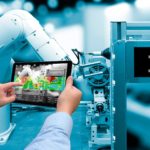Industry 4.0 is so much more than the Internet of Things
Under the media’s radar and away from the latest trends, the industry keeps making headway in its road to digitization. Much is being said about the importance of connecting all machines, the Internet of Things, but transformations will be far reaching and of all kinds.

When people talk about the digital revolution, we frequently focus on its more striking and mundane aspects: social media, brands like Apple, Google’s almost uncanny way of knowing what we want at all times, driverless cars… however, out of the limelight, some substantial changes, probably more transcendental, are also taking place: it is in the industrial sector where digitization may end up having a bigger impact.
The so-called Industry 4.0 was the topic discussed in a recent session organized by the ESIC Business School’s Institute of Digital Economy. The event helped dispel some preconceived ideas on the topic, which David Pozo, technical director of Siemens Spain, defined as the replacement of human cognitive force with machine cognitive force.
Pozo underscored that Industry 4.0 “is so much more than just the Internet of Things and connectivity, as is usually thought. The automation of the engineering processes used is essential.” The digital revolution affects the industry in many ways, and to illustrate this point Pozo talked about Wavegarden, an engineering company from the Basque Country that designs, manufactures and installs wave generation systems and lagoons for surfing purposes, as it has already done in the Basque Country, Wales and the U.S. Using data it gathers from surfers, Wavegarden is already optimizing the design of its machine to increase its robustness and generate waves that conform to the level of each surfer.

Virtual and augmented reality is also starting to have a huge impact on industrial production. Pablo Aguirrezábal, senior researcher at Tecnalia Research & Innovation and professor at ESIC, detailed some of these uses in a recent report. Virtual reality is especially useful to train workers without having to stop machines or even production lines, and also to run simulations based on new product designs and plan for their location virtually.
But strategies and business mindsets also need to adapt as technology changes, becoming more flexible and dynamic. Juan Gascón, Head of Innovation at AMETIC, the association of electronic, ICT and telecommunications companies, used a graphical example: "If a Spanish agri-food company creates a smart-greenhouse that allows it to produce better vegetables, what is has to do, instead of focusing on selling the vegetables, is to sell the technology across the world.”
The paradigm shift is here and is not limited to isolated cases: “The industrial focus has already shifted from hardware to software,” explained Pozo. “Before, recouping the cost of a machine could be essential for an industry, but today, it is much easier to change the hardware with a new software suite. And from a commercial point of view, the focus has also changed: before, people used to sell machines, now they sell products and services.”
Luis Martín, CEO of Digital Consulting Firm Barrabés, in an interview with the BBVA Innovation Center said that “the pace at which the industry is digitizing is brutal: not machining or automating, but digitizing. This means empowering the final user to control processes end-to-end, with information, power and decision making capabilities at all times. The possibilities in terms of scalability are augmented, and also complexity.” Cyber manufacturing plants may still be too complex and alien, but they are going to improve our lives. Two centuries ago, our ancestors already went through a similar process with the first industrial revolution.
*"If you liked this article and find useful content related to the topic of digital transformation and innovation, visit BBVA Careers and connect with us on LinkedIn"